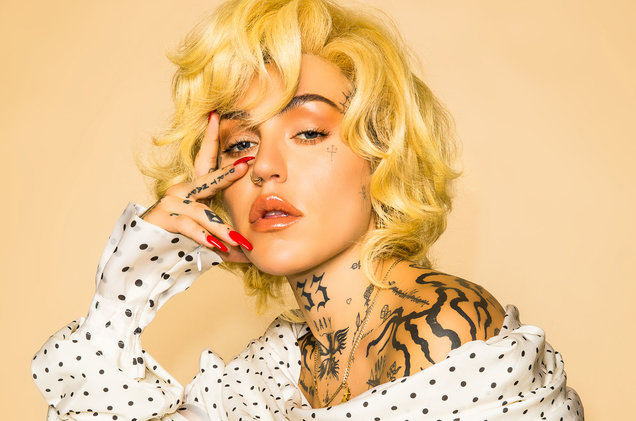You look at the cover of Brooke Candy’s debut album Sexorcism and what looks back at you? A hauntingly pale creature, with six breasts, hoof-like feet and a tongue that unfurls all the way down to its chest. This, after years in the making, is Candy’s final form.
From the unapologetic club-rap of her first few singles (Das Me, Everybody Does), to the more commercial collaboration with Sia (Living Out Loud), to the aggressive punk-inspired sound of her 2018 tracks (War, Nuts), it’s definitely taken Candy a few years to find her sound. And with Sexorcism, it seems she might have done it. Perhaps ironic, considering how collaborative this project is – Iggy Azalea, Charli XCX, Rico Nasty, Ashnikko all feature, among others.
Sexorcism takes the best parts of these genres and fuses them together. The result is gritty, graphic, fiercely independent, catchy, graphic, freaky, underground with a punk attitude, and – I really can’t stress how graphic this album is. Don’t play it in the car with your family (one look at the tracklist should give you an idea). Mix all of these ingredients with some forward-thinking production, mostly from Oscar Scheller, and you have something that, like the cover, is weird, sexy, and exciting.
Granted, at times Candy’s songwriting is a little questionable. In Nymph, she talks about sucking a unicorn every night and the first verse of Swing centres around weird pasta innuendoes, which are kind of funny but not really in a good way. Regardless, they’re both enjoyable tracks, and “good” songwriting isn’t what I would be listening to Candy for in the first place. What I’ve come to expect from Candy is fun, raunchy, anarchic anthems about liberation and gratification.
The issue is that too much of this can be a bad thing. By the time you reach track 12 of an album full of shockingly graphic and explicit songs, they aren’t so shocking anymore. Most tracks on Sexorcism – individually – are good but put them all together and it can become a little one-note. The album might have benefitted from the inclusion of promo single Happy, which was released at the beginning of the year but for whatever reason does not make an appearance. Dealing with Candy’s own issues of mental health and identity, it could have made a welcome change of pace.
As an artist that has only recently settled on a specific sound and aesthetic, it’s not surprising for it to be a little flawed however, and that even can be forgiven when you think of what it is that Candy stands for – working specifically with artists that are either female or queer (or both) to amplify their voices, express their sexual desires, to be a “freak” and to love every second of it.
Score: 7.5
Words: Jacob Chamberlain
Photo Source: Billboard

